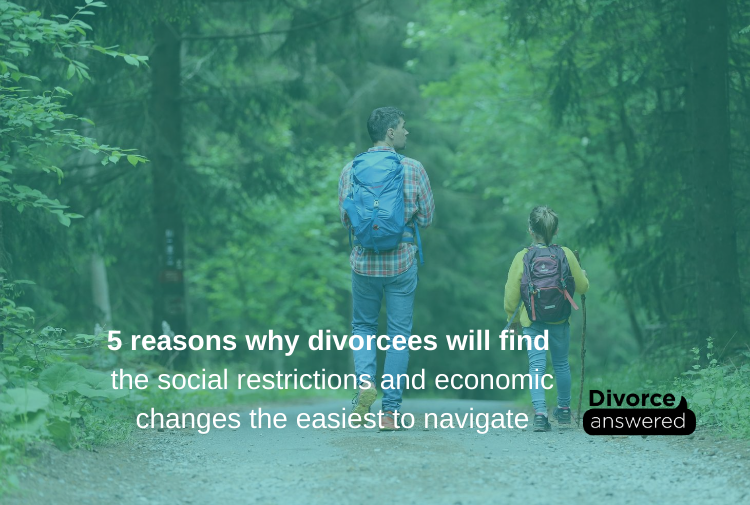5 reasons why divorcees will find the social restrictions and economic changes the easiest to navigate

HOW SEPARATED INDIVIDUALS WILL ADJUST SEAMLESSLY INTO QUARANTINE AND RESTRICTIONS
Single parents, followed closely by single individuals, that have been through a divorce are the demographic most likely to find the coronavirus epidemic and associated social restrictions the easiest to navigate. Not every divorce is a traumatic experience, however, divorce has forced people to adjust to change which in itself is challenging. Rachael Scharrer, Life Change Counsellor and Separation Strategist at Divorce Answered, shares 5 reasons why divorcees will find the social restrictions and economic challenges the easiest to navigate as a demographic.
Today, many people are struggling with the shock of losing their jobs, experiencing a significant change in lifestyle with cafés and gyms closed, purchase restrictions at the supermarket and price gouging on products during a difficult time. Today’s economic and social ‘pinch’ won’t be too daunting for the divorcee segment of the population that have had to find the funds to pay expenses associated with divorcing, establish new living arrangements and navigate social dynamic changes.
Here are five reasons why divorcees will find the social restrictions and economic challenges the easiest to navigate:
- EXPERIENCED WITH CHALLENGES. Divorcees have already been through a challenging and often difficult or tumultuous time through their break-up and divorce – for some, it was so complex that this Coronavirus feels like a “walk in the park”
- EXPERIENCED WITH BUDGETING. Divorcees have had to learn to budget after their relationship ended. Many divorcees that walked away financially challenged, will already understand that they can’t spend more than they earn. They will be price-conscious and savvy shoppers.
- EXPERIENCED IN SELF-SUPPORT. Divorcees have had to learn to rely upon themselves and not their partner to support them financially or emotionally. When there isn’t anyone to ‘bail you out’ or ‘prop you up’ when you hit desperate times, you have to find the strength from within to build your confidence, resilience and independence.
- EXPERIENCED IN ASKING FOR HELP. Divorced people are used to asking for help and utilising services as needed. Many divorcees will already be set up with Centrelink and connected to services to help support them. Some divorcees were humbled and connected with support services, counsellors, social workers and government agencies for support and benefits. This is something that many individuals and families are likely to start doing for the first time due to the current economic situation.
- EXPERIENCED IN CHANGES TO SOCIAL STRUCTURES. For many divorced individuals, their break-up also involved breaking-up with some friends. It’s common to hear divorcees complain that they aren’t invited to ‘couples dinner parties’ any more. Others feel like their situation drives some people away and moves other friends closer to them. The divorcee has also had to learn new ways of socialising as a ‘single’ person and adapted accordingly.
- (And an extra point for the divorced parents:) EXPERIENCED IN SOLO PARENTING. Divorced primary carer parents are used to having their child without another adult present supporting them through the daily routine. Primary carers of young children will find that while being stuck at home will be more difficult than usual, it won’t be so shocking to have the children at home.
Our current social and economic challenges are the first of its kind in many people. It’s as though we are going through another break-up with what we used to do socially, financially and for leisure and finding a new way which requires change and adjustments. However, the divorced population are better skilled in navigating a challenging new situation thanks to the skills that they learned going through break-up and separation.
